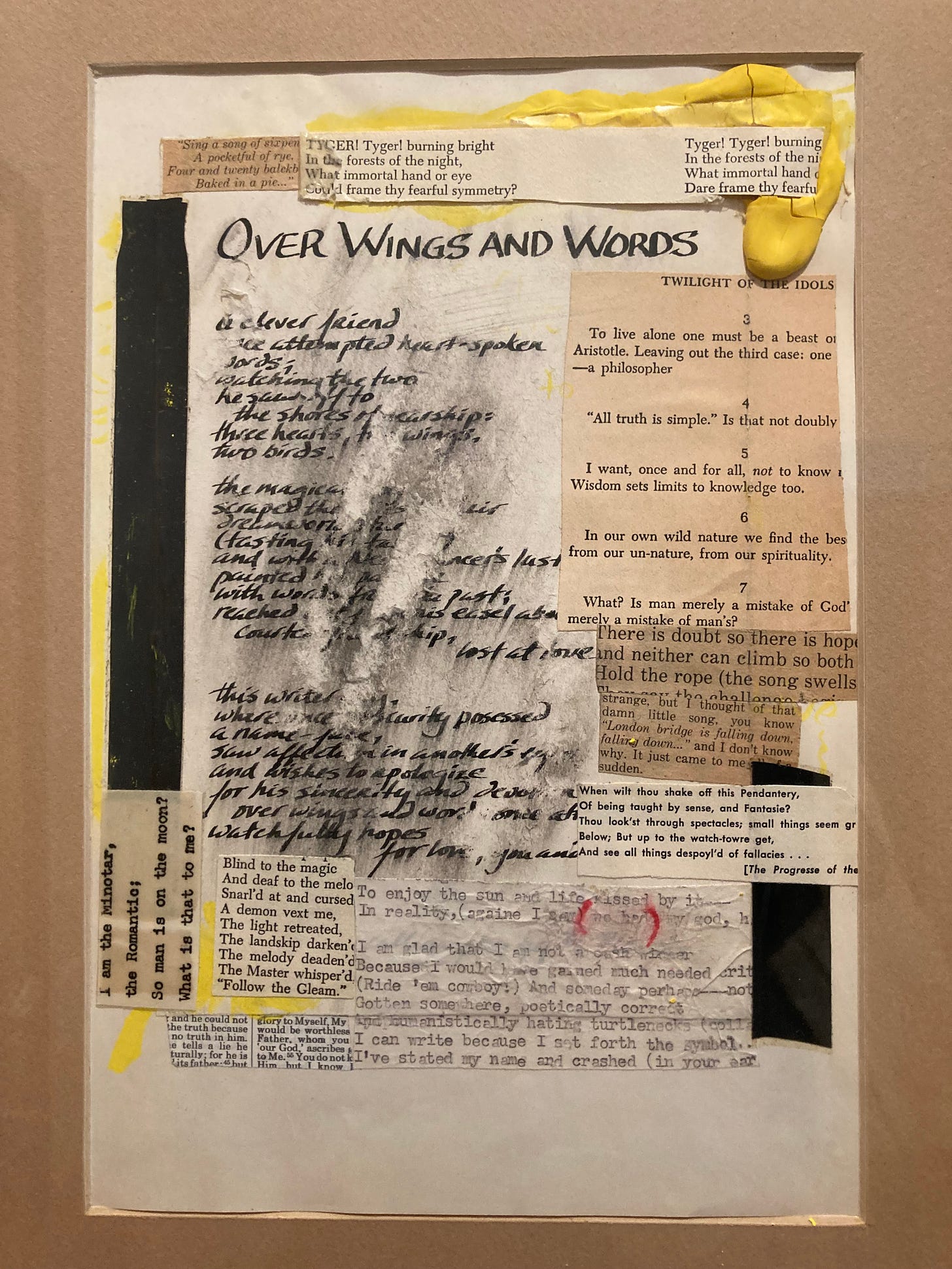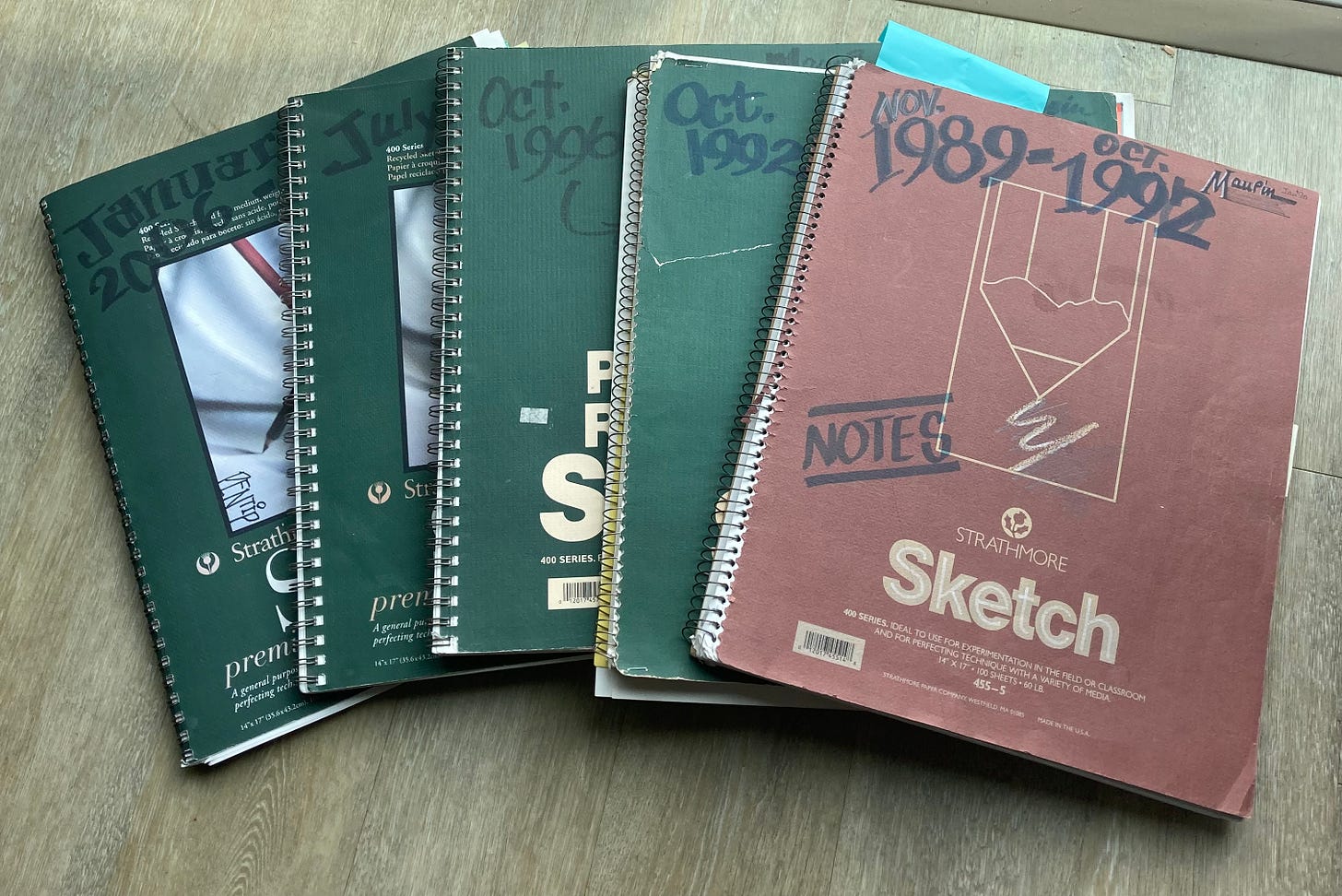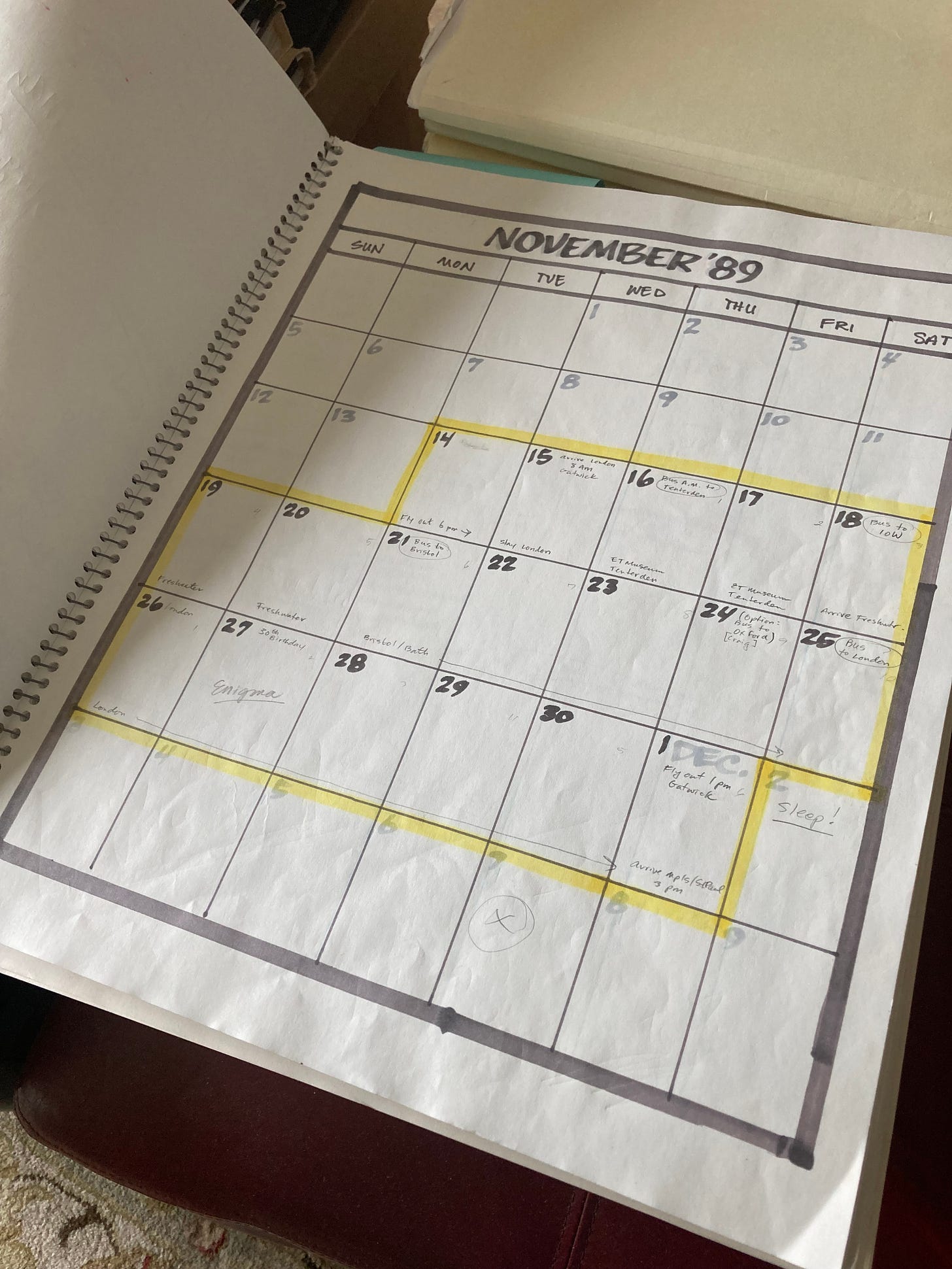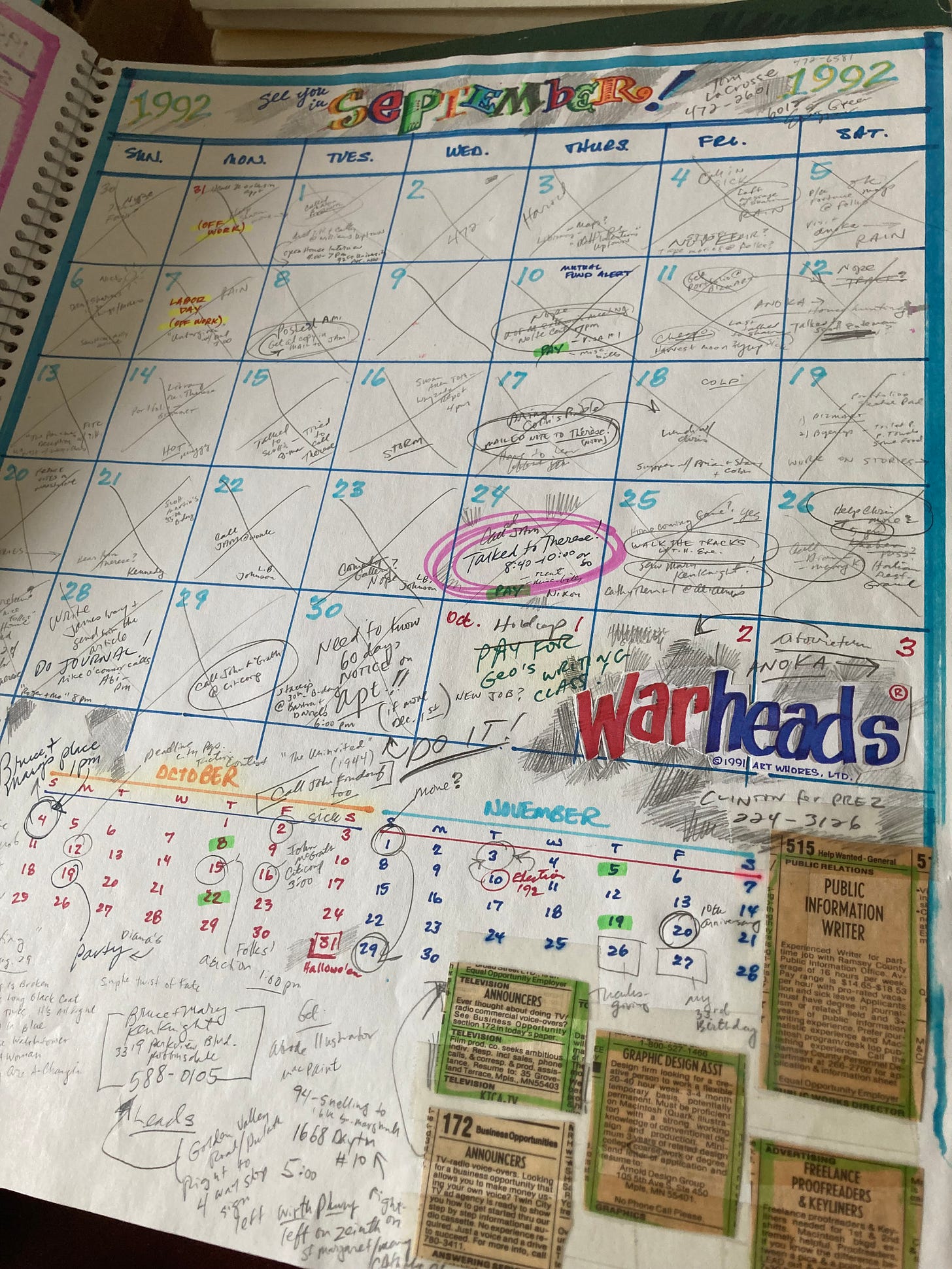“Even in a perfect world where everyone was equal
I'd still own the film rights and be working on the sequel.”
—Elvis Costello, “Everyday I Write the Book”
A diary or journal is, well, a relationship. It will be there for you if you are there for it. So, a good relationship.
But where are you right now? Yes, you dear reader. Right now.
I might imagine you are:
Sitting in the kitchen working on your laptop while your partner is outside in the garden picking onions. You both talked about making pasta for dinner. It’s going to be delicious.
In a cafe or bar, lonely, reading and hoping for a change in the weather (internal or external). Should you stay or should you go? If you left, where would you go? Why should you stay?
Preparing to meet up with friends and family for a picnic outing. Everyone is sending excited texts ahead of the event. This is going to be a great day. You’re giddy-happy.
Dragging yourself from bed and feeling hopeless about the future. But you tell yourself: “Do one thing. You’ll feel better if you do Just One Thing.”
Thinking of a recently departed parent, and missing their hugs. It’s almost scary how you recall the crush of their body on yours. You feel small, but then laugh. The laughter makes you feel lighter. You enjoy this.
When I think of you, you become me. I don’t know if you realize that, but you do. It’s an odd thing about human relationships: We’re all more alike than we are dissimilar.
Truly.
Don’t have the data on this, but I’m willing to bet that social media and the Internet in general have made us assume we know exactly who others are by what we read and see online. Please, don’t think I’m being facetious saying that. It’s at base a ridiculous concept—thinking we know everything about other people. Heck, I have one brother I’ve known all my life and he still surprises me. And mostly in a good way.
For example, who do you think this person is, and what do you think he’s doing?
Consider the space, the images on the walls, the furniture, lighting, knickknacks and various items. What do you see? What do you think about what you see?
Take all the time you need.
No hurry.
Hey, even do this if so moved…
That photo is vital to where this post is heading, so thanks for indulging in the game to begin with. Other questions: Since this isn’t a “selfie,” who do you think is taking the photo? What might their relation be to the subject? Partner? Sibling? Parent? Why are they taking the photo? What is their motivation?
Okay, time’s up.
If you guessed me, you’re right. In my 1989 apartment in the Minneapolis suburb of Hopkins, Minnesota, photographed in my workspace with artwork on the walls and peering at my sketchbook calendar journal, snapped by my late maternal grandfather, David Raymond Adams aka Grandpa Ray. What Grandpa thought of my place is a mystery to me (he passed many years ago) but I’m grateful that he preserved the moment in a photograph.
It’s one of the few photos that shows “the drawing board.”
Oh how I miss that particular piece of furniture.
Back to the Drawing Board
No recollection of where I bought it, but willing to bet the inspiration for owning it in the first place came from my late father, Paul. He was an architect, and worked at a drawing board in our Maryland basement. It probably lodged in the back of my mind that he was doing something important—and I wanted a piece of that action.
I loved the drawing board, and everything it stands for. I wish I had it right now, but it’s long since gone. More than that, it was a wide canvas with which to draw, sketch, doodle, do party invite paste-ups, collages, anything my heart fancied. To one side of it, probably to my right in the above photo, was my electric typewriter (an Olivetti) and file cabinets to keep journals, notebooks, and project files (yeah, guess I’m that kind of homebody).

Art needs space: for creation, for the tools, and also the space of time for work. The drawing board was home to the most non-portable items in the self-reflection ecosystem: The sketchbook calendars.
There are five in total.

The impetus for the 1989 calendar was a research trip I’d planned in 1988 after completing a draft of my first spec screenplay. It was a great place to plan the month ahead, with extra space for quick ideas and notes to carry forward, usually in the portable notebooks. You’re probably curious to take a peek inside.
Sure, ’k. Let’s.

They start out pretty spare, with not a lot of room at the bottom for further notes or projections of the months ahead (or retrospection on the past month, as some calendars do). November 1989 was the plan for the big UK research and reunion trip, wisely indicating I’d need to catch up on sleep after being jet-lagged December 2.
But the calendars got more complex as time went on.

This month is very revealing, especially around Sept. 25 through the 28th, where I’ve noted: “Walk the Tracks,” and Monday the 28th’s “Do Journal.”
Here’s the beautiful thing: It’s that full-on, self-reflection ecosystem stuff. With Friday’s “Walk the Tracks,” I can go back to the journal date, or better yet get a bird’s eye view via the WordPress blog, where I wrote about the whole thing from a wider perspective (and linked above).
For Monday, Sept. 28, 1992, let’s pull out the journal and see what the oracle reveals…
—Uh-oh, sad trombone.
But WAIT, there’s more!
The journal entries triangulate around that date, so I must’ve been prodding myself to commit to paper. The earliest entry to 9-28-92 was on 9-18-92. That date accurately reflects I had dinner with my brother, his wife, and their first-born son. After 9/18 the journal entries pick up at Oct. 2, 1992, with a full recap—the very one I’d prodded myself in the sketchbook calendar four days before:
Well, I did talk to T— but it wasn’t until later that week, on Thursday night. I waited all week watching presidential history documentaries on TV, and when Thursday night came I thought I’d give the number another try. She was the one who answered the phone. She was really excited and said she had got my card and that she was on the other line and would call me back. At a little after 8:30 I got the call from the AT&T operator and told her to put the call through (this was my Van Morrison connection, “Operator, put me through to my baby now.”) We talked for about two and a half hours. It was wonderful. She sounded great—it was sheer tonic to hear her voice again.
That was a telephone reunion with an old girlfriend. It’s amazing to read the past like it’s still burbling away in the present moment.
Journals can do that for you.
“Well, my baby’s gone—so’s summer, and it brings on a cool night breeze.”
—Van Morrison, “I Need Your Kind of Loving”
Apparently I’d jotted stuff frequently in the 1992 notebook, not the least of which is the above Van Morrison lyric, as well as some fairly off-color stuff:
Bungee Driving—it’s green, let’s go.
Sex should be as regular as meals, you know, three squares, two rounds, and one over easy.
Annie Dillard says not to hold back when you’re writing—don’t “save it” for another time, give it up right then and there.
Write an obituary for I.L. Waitensee.
Gary Snyder [in St. Paul]—waited for a word about “new ethics,” none came. But why should I have expected that? He’s a poet, not a reformer.
Jimmy Castor Bunch, “The Troglodyte” The Cheshire cunt. A swim wearing only a smile [Sarah Vaughan] Like a punchdrunk boxer whiffing another slug.
—All these and more landed in portable notebooks that, in some cases, can be traced back to calendar dates and possibly a long-form journal entry.
It’s all there for the lookin’. And that’s the self-reflection ecosystem, full-circle.
So what’s “the future” of all this “past”? Which stuff is worthless trash and useless ephemera, and what’s still of value? Are there interconnections and possibly untapped wells of creativity? Are there stories behind the stories, perhaps ones that only the span of time will finally allow us to see?
Could technology be an answer?
Is anything?
You Invent the Future
I’ll have some more thoughts on this for part 5—the last of the series—because that’s the big question hanging out there now that the diaries, journals, notebooks and all are loaded into large black plastic boxes.
What happens to these two ominous boxes—sealed to shut out the sun’s severe radiation and keep them solid for another decade, maybe.
What will be their fate?
And what might be the “drawing board of the future”?
It’s a great question.
For those of you new to this series, these questions all erupted as I was wrapping up pasting word processed journal entries for a HUGE chunk of time after my parents died in 2008 and I left a corporate job in 2012. In between that time I started a WordPress blog (Completely in the Dark) that became my lifeline to the past. What made it possible was sorting through family photos and memorabilia I’d inherited and marrying all that up with the diaries, journals, notebooks, and sketchbooks I’d created since I was 13 years old.
Crazy, huh?
So this has been a reckoning. I’ll file them away so I can keep writing a 2023 journal that has a section leftover from typewritten 2017 entries. Reading over those as I was pasting them in the book reminded me how many people died during that year, more than I’d ever known even after my parents passed and prior to the Covid-19 pandemic.
Much of this might resonate with some of you. Or, as Bob Welch of Fleetwood Mac once wrote, “And I know I’m not the only one, to ever spend my life sitting playing future games.” Author Joyce Carol Oates was asked a similar question in a New York Times magazine interview just last weekend.
“Anything you create that transcends time is in some ways more real than the actual reality of your life.” —Joyce Carol Oates
Oates had previously written an essay on boxing and said something to the effect that life is about the fight and the rest is just waiting. Times writer David Marchese asked her, “Do you feel that way about writing?” She seemed a little taken aback but her response was emotional, thinking about lively conversations with her husband and happy interactions with college students. “All I have left of all that happiness,” she said, “is my writing of that time. A book or two, some stories … Everything that you think is solid is actually fleeting and ephemeral. The only thing that is quasi permanent would be a book or work of art or photographs or something.”
Then she says, “Anything you create that transcends time is in some ways more real than the actual reality of your life.”
It’s possible to achieve that in any life, no matter how early or late you feel it is.
I mean, if I would’ve felt—at 13—it was impossible for me to see a future in marking time and experiences in diaries, I probably would’ve just given up. Psychologically speaking, I likely steeled myself by imagining “future me” to be a better parent/friend/partner to me than I felt “present me” had been.
It’s like that parent who stays close beside their sick child—you know, that kid puking up the Past all over the beautiful best shirt of your Present and hoping some Future laundry will wash it all away.
Or some psychological shtick like that.
Later, I wrote in the Completely in the Dark blog, “You need a strong imagination to see into the future.”
I still believe that.
Particularly because for whatever admirable qualities the Present might hold, it’s still getting the full Nelson from the Future on the stinky gymnasium floor where the Past creaks and cracks, and maybe crumbles under the weight of the whole enchilada.
Maybe. Or maybe not.
—Okay at this point I’ll lay off the cheap metaphors.
“The future sends a sign
Of things we will create
Baby it's alright
And so have faith
Oh yeah
You invent the future that you want to face…”
—Fleetwood Mac, “Future Games”
You invent the future you want to face? I mean, really? What does that even mean in the context of everything going on in the world of 2023? “Crisis? What crisis?” aside, let’s look at how that might even be remotely possible.
I’m inviting readers to submit ideas for archival, storage, retrieval, scanning and digitizing—anything to aid in preserving one’s past and carrying it forward. Your comments will be helpful in concluding this series.
It’s been a crazy ride. Glad you came along.






Lots of food for thought here Michael, thankyou. Peace, Maurice